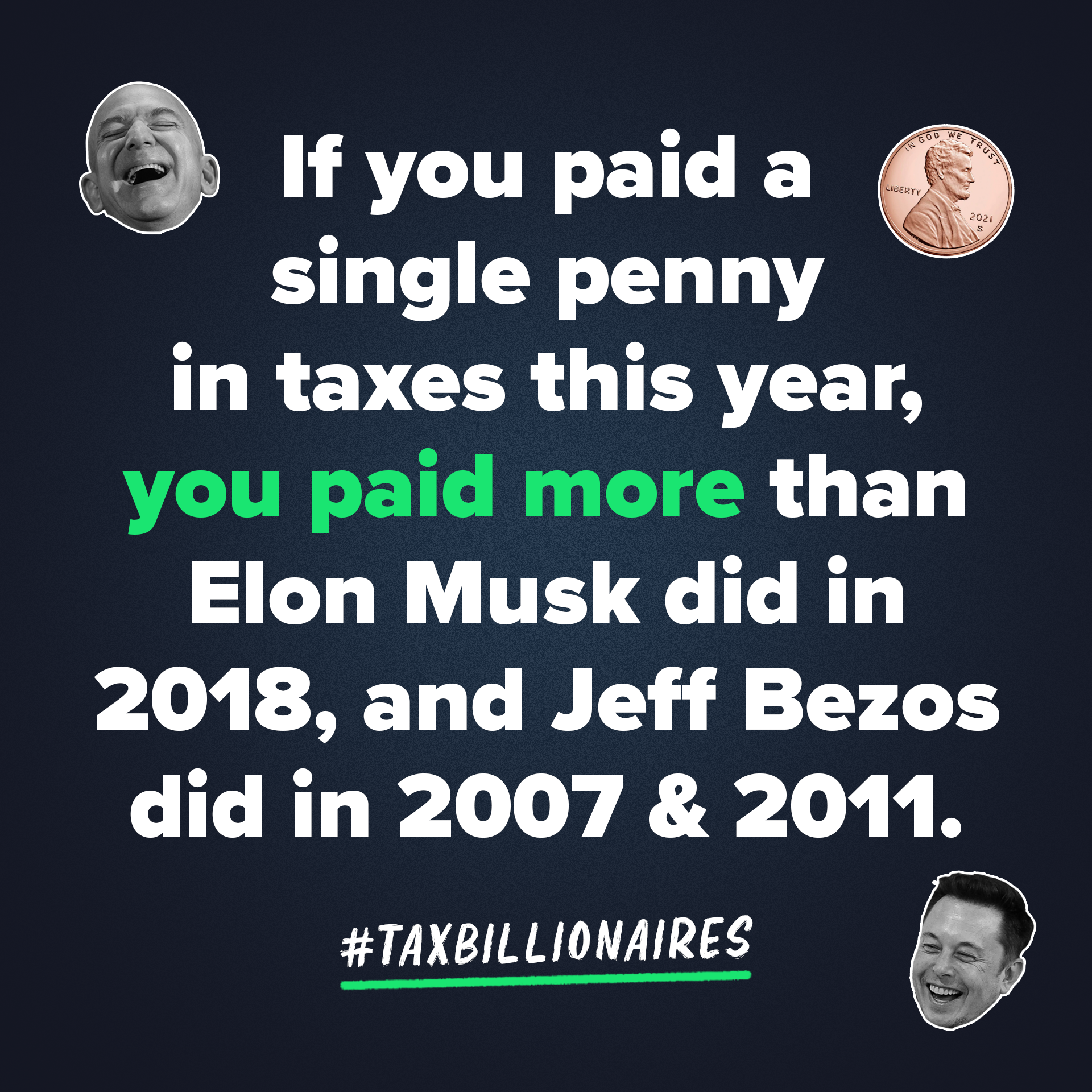
Billionaires in America are paying a lower tax rate than teachers, nurses, and firefighters. They can get away with this because while income from wages is taxed yearly, income from the growth of wealth, like stocks and other assets, is only taxed when the asset is sold. And billionaires? They never need to sell.
Our tax code taxes income from workers’ wages much more than it taxes income from wealth.
There are essentially two tax codes in America. One requires workers to pay income taxes out of every paycheck. The other lets billionaires defer paying taxes for years or avoid paying taxes altogether on their major source of income: the growth in their assets, such as a soaring stock portfolio or rapidly appreciating art collection. They don’t pay taxes unless they sell those assets, which they often don’t need to do. Instead they borrow against those assets to live lavish lifestyles.
Billionaires aren’t paying their fair share of taxes.
- According to IRS data, in some years billionaires Jeff Bezos, Elon Musk, Warren Buffett and Michael Bloomberg paid zero federal income taxes even as their wealth grew by billions of dollars.
- Over a recent five-year span, according to IRS data, the 25 wealthiest billionaires paid an effective federal income tax rate of just 3.4% when their wealth growth is counted as income.
- Over a recent nine-year period, the 400 wealthiest billionaires paid an effective federal income tax rate of only 8.2% when the growth in the value of their stock holdings are counted as income, according to a White House analysis.
- The average federal income tax rate for all taxpayers was 13.6% in 2019.
Billionaires are getting richer while working families struggle.
America’s roughly 750 billionaires grew $2 trillion, or 70%, richer, during the first two years of the pandemic, even as 80 million of their fellow Americans were sickened by the Covid virus and almost one million died from it.
Wealth inequality is getting worse.
The growing gap in wealth between the ultrarich and everyone else has grown so wide that these 750 billionaires, who are collectively worth $4.5 trillion, had more wealth than 65 million households in the bottom half of American society (total net worth: $4.2 trillion).
Billionaires have outsize influence over our democracy.
Billionaires threaten our democracy by translating their economic clout into political power through campaign contributions. Aided by the Supreme Court’s controversial 2010 Citizens United decision that opened the floodgates to special interest campaign cash, billionaires have over the last decade become a bigger and bigger factor in elections. In the 2020 election cycle 661 billionaires together provided one of every 10 dollars donated to federal campaigns, pumping $1.2 billion into the political process.

Tax the increased value of the assets of the ultra-rich, like corporate stock, similar to the way workers’ wages are taxed, whether they sell those assets or not. This way income from wealth will be taxed more like workers’ wages.
What is a billionaires income tax?
A billionaires income tax would annually tax the growth in the value of corporate stock and other assets of the super-wealthy. This is their biggest form of income, and it can now go entirely untaxed. President Biden and the chairman of the Senate tax-writing committee, Ron Wyden (D-OR), have each proposed versions of such a tax. They are compared here.
How does it work?
A billionaires income tax would annually tax the rising value of assets, a principal source of income for the super-wealthy that now can go entirely untaxed unless the assets are sold. The growth in value of publicly traded assets like corporate stock is easy to determine and so taxes on those gains would be collected each year. Taxes would be collected less frequently on the growth in value of assets harder to assess, such as private businesses and fine art.
How would we tax increased values of hard-to-price assets?
Stocks, bonds and other financial instruments are priced every day through market trades. The same is not true of non-tradable assets like private businesses, collectibles and yachts. President Biden’s plan would rely on estimated value changes, which could be challenged through appraisals. Senator Wyden would assess taxes annually but defer payment until such assets were sold, which would determine the increased value. Interest would be charged for those years taxes were deferred. Learn more here.
How much would the billionaires income tax raise and what could it pay for?
President Biden’s version of a billionaires income tax could raise $437 billion over 10 years. Sen. Wyden’s tax could raise more than $550 billion. This new revenue can be used to help lower the costs to working families of healthcare, childcare, housing, education and more. It can help fund solutions for the climate change that’s threatening our communities with wildfires, droughts and floods.
Here are examples of what $550 billion could pay for, based on the Democrats’ Build Back Better plan that passed the House of Representatives:
- Lower the costs of healthcare ($400 billion) AND housing ($151 billion).
- Expand the Child Tax Credit for four years ($484 billion).
- Provide paid family leave ($205 billion) AND eldercare ($209 billion) AND Medicare hearing coverage ($37 billion).
- Make clean energy investments to prevent climate catastrophes ($555 billion).
- Reduce the cost and improve the quality of childcare ($538 billion).
- Provide universal free pre-K ($214 billion) AND an expanded Earned Income. Tax Credit ($135 billion) AND improved child nutrition ($30 billion) AND lower college costs ($29 billion).


